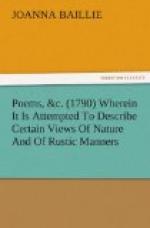And do’st thou then thine arm extend
And may I take thy lovely hand?
And do thine eyes thus gently look,
As tho’ some kindly wish they spoke?
My gentle Phillis, tho’ severe,
I do not grudge the ills I bear;
But still my greatest grief will be,
To think my love has troubled thee.
O, do not scorn this swelling grief!
The laden bosom seeks relief:
Nor yet this infant weakness blame,
For thou hast made me what I am.
But hark! the sailors call away,
No longer may I ling’ring stay;
May peace within thy mansion dwell!
O, gentle Phillis, fare thee well!
A CHEERFUL TEMPERED LOVER’S FAREWELL TO HIS MISTRESS.
The light winds on the streamers play
That soon shall bear me far away;
My comrades give the parting cheer,
And I alone have linger’d here.
Now Phill. my love, since it will be,
And I must bid farewell to thee,
Since ev’ry hope of thee is flown,
Ne’er send me from thee with a frown;
But let me kindly take thy hand,
And bid God bless me in a foreign land.
No more I’ll loiter by thy side,
Well pleas’d thy gamesome taunts to bide;
Nor lovers’ gambols lightly try
To make me graceful in thine eye;
Nor sing the merry roundelay,
To cheer thee at the close of day.
Yet ne’ertheless tho’ we must part,
I’ll bear thee still upon my heart;
And oft’ I’ll fill the ruddy glass,
To toast my lovely scornful lass.
Far hence, upon a foreign shore,
Still will I keep an open door,
And still my little fortune share
With all who ever breath’d my native air.
And who thy beauteous face hath seen,
Or ever near thy dwelling been,
Shall push about the flowing bowl,
And be the matter of the whole.
And ev’ry woman for thy sake,
Though proud and cruel, as they’re weak,
Shall in my walls protection find,
Thou fairest of a fickle kind.
O, dearly! dearly! have I paid,
Thou little haughty cruel maid,
To give that inward peace to thee,
Which thou hast ta’en away from me.
Soft hast thou slept, with bosom light,
Whilst I have watch’d the weary night;
And now I cross the surgy deep,
That thou may’st still untroubled sleep—
But in thine eyes, what do I see,
That looks as tho’ they pitied me?
I thank thee, Phill. yet be not sad,
I leave no blame upon thy head.
I would, more grac’d with pleasing make,
I had been better for thy sake,
But yet, perhaps, when I shall dwell
Far hence, thou’lt sometimes think how well—
I dare not stay, since we must part,
T’expose a fond and foolish heart;
Where’er I go, it beats for you,
God bless ye, Phill. adieu! adieu!
A PROUD LOVER’S FAREWELL TO HIS MISTRESS.
Farewell thou haughty, cruel fair!
Upon thy brow no longer wear
That sombre look of cold disdain,
Thou ne’er shalt see my face again.
Now ev’ry silly wish is o’er,
And fears and doubtings are no more.




